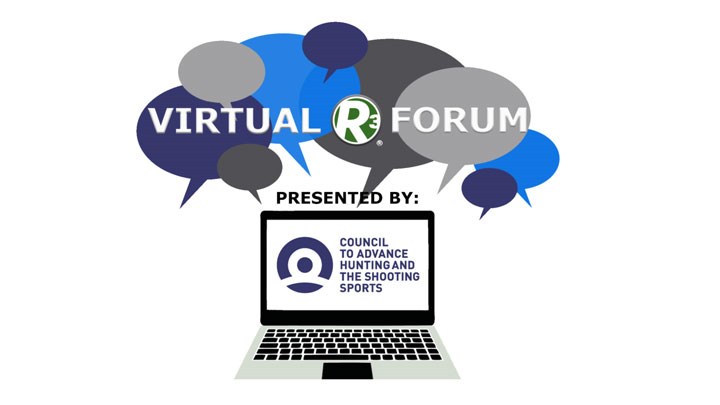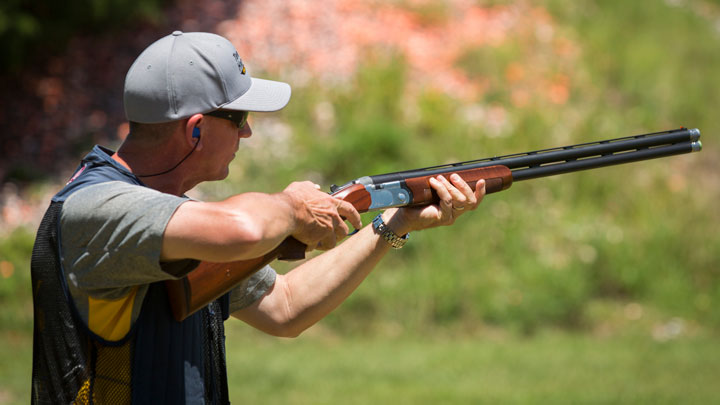
by Chris Chaffin - Thursday, October 8, 2020

Maintaining momentum in the outdoor community’s push to retain, recruit and reactivate (R3) hunters, target shooters, anglers and other outdoor recreationalists, the Council to Advance Hunting and the Shooting Sports (CAHSS) conducted a Virtual R3 Symposium in August. Some 449 individuals representing more than 150 different organizations, including more than 35 state fish and wildlife agencies, numerous outdoor companies, non-governmental organizations (NGOs) and outdoor media, took part with the program featuring noted individuals and representatives of outdoor organizations all committed to leading the way in improving how we approach the mentoring and the marketing of R3 programs and activities. As reported by this website in June, the in-person symposium was changed to a virtual forum in light of challenges presented by the COVID-19 pandemic. For those unable to attend the virtual meeting, CAHSS posted all sessions on its YouTube channel, which can be accessed by clicking here.
As expected, mentoring was a primary focus of participants. Following is a summary of the significant findings listed in the forum’s “Making Mentoring Work” Executive Summary (ES). (To see the full ES, click here and scroll down to page 17.)

There is a substantial opportunity for mentoring and increasing participation in hunting and target shooting. Nearly 10 percent of survey respondents selected to represent the U.S. population indicated at least a moderate level of interest in becoming a potential hunting mentee, and over 18 percent cited at least a moderate interest in becoming a target shooting mentee.
In the U.S. population 18 years or older, those interested in finding instructors include the following.
Nearly all existing organized mentoring programs are just another form of skills training and do not reflect the characteristics of the apprenticeship-type mentoring that likely gave rise to the mentoring ideal.
Prospective students do not like the term “mentor.” Focus group participants and survey respondents strongly indicated that “mentor” should be a term that a participant bestows on an instructor once a relationship is built.
Recommendation: R3 practitioners should no longer identify an R3 effort as a “mentoring” program. Instead, mentoring programs should be referred to as “personal instruction” programs since “instructor” is preferred by prospective students.
(Note: For the remainder of this summary, mentoring programs will be referred to as instruction programs, and mentors will be referred to as instructors.)
Just because someone tried hunting or target shooting in the past doesn’t mean he or she doesn’t need personal instruction. Interestingly, a significant proportion of individuals who show an interest in being instructed (37 percent of potential hunting students and 46 percent of potential target shooting students) have already tried hunting or shooting sports. However, they commonly do not have a friend or other member in their current social group to instruct them. Given their existing interest and personal experience, these people should be just as much of an equally high-priority (if not a higher priority) target audience as those who are interested but have no previous experience.
Neither current or potential instructors nor potential students expressed a preference for interacting with individuals of any specific age or gender.
Only small percentages of current hunters and recreational shooters have not taught or mentored someone. Most, in fact, seem very willing to take time to instruct family and friends, especially when asked. In addition, current participants are less willing to teach those who they do not know.
Recommendation: Instructors for R3 instruction programs should be recruited from hunters and target shooters who already teach others.
Many current hunters and target shooters are willing to instruct others beyond their social circle but haven’t done so because they haven’t been asked.
Recommendation: To increase the number of hunters and target shooters willing to instruct someone outside their social circle, R3 practitioners should invite them to become instructors.
A majority of hunters and shooters are not interested in instructing beyond what they do within their families or social circles. The focus groups indicated that hunters and target shooters who were already avid instructors are more willing to instruct others outside their social circle and at a higher frequency. This group could be targeted with focused recruitment efforts to help introduce more “non-traditional” faces to hunting and the shooting sports.
Recommendation: Considering that people without support need organized instruction programs hosted by state agencies and NGOs, programmatic instruction programs should focus on communicating with as many hunters and shooters as possible to identify and recruit the “super instructors” willing to work with people outside their social circle. Then the next step is to facilitate matchmaking, or brokering, to align students with instructors.
Material incentives are not significant in motivating people to become instructors. For those who like incentives, product discounts and access to exclusive hunting and shooting opportunities are top preferences. It is interesting to note that hunters and target shooters express essentially the same values and motivations for instructing others. Thus, instructor recruitment messages for hunting and shooting sports programs could be very similar. However, based on potential students’ survey responses, hunting and shooting sports programs should not necessarily be combined. Over three quarters of potential target shooting students had zero interest in hunting.
Recommendation: If material incentives are offered to instructors, the given organization should consider providing special access to hunting areas for instructors and their students and partnering with other organizations or industries to provide product discounts.
Hunters and target shooters find instructing novices more appealing when a trusted organization facilitates their introduction to prospective students.
Recommendation: Organizations vested in R3 should consider brokering relationships between potential instructors and students and provide a process and venue for them to bond before instruction begins.
Many beginning- and intermediate-level hunters and shooters are interested in introducing new participants but feel unqualified to be an instructor. Respondents indicated that checklists of skills to teach, gear to purchase and knowledge to impart would be instrumental in their decision to become an instructor. Other helpful resources include a service to handle student background checks, and an established instruction curriculum.
Recommendation: R3 practitioners should recruit, encourage and support instructors of all experience levels. They must also provide resources and guidance to encourage those who lack confidence in their ability to instruct.
Safety remains a top priority and requirement for all students seeking instruction.
Recommendation: Instruction programs and instructors must address and emphasize safety from the first recruitment pitch until the final programmatic contact.
Prospective students prefer to be instructed by a trusted friend or family member but view an experienced hunter/target shooter as equally acceptable.
Recommendation: Agencies and NGOs have an underused opportunity to broker relationships between potential qualified instructors and students. Providing opportunities for meet-and-greets will help both parties be more comfortable when heading to the classroom, field or range.
There is no single optimal way to identify and contact potential students and they do not prefer the same communication channels preferred by potential instructors. Though prospective instructors and students express different preferences for advertising platforms, both groups highly ranked state fish and wildlife agency websites.
Recommendation: State fish and wildlife agencies should ensure that both student and instructor resources are available on their websites. Links to these resources should be included in advertising targeting student recruitment.
Much more valuable information and insights were presented during CAHSS’ virtual forum and in the follow-up evaluation. NRAHLF.org will continue to share this important information as the hunting community works to foster participation in traditional outdoor sports.
E-mail your comments/questions about this site to:
[email protected]
Proudly supported by The NRA Foundation and Friends of NRA fundraising.
